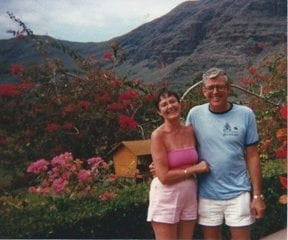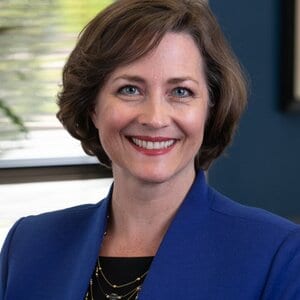Generosity of East Moline Couple Makes Difference for Local School Districts
Sharon Glassman is fondly remembered as a quiet, thoughtful person who worked at the International Harvester Plant in East Moline.
She possessed a cheerful, kind-hearted sensibility that shone through whenever she spoke. Her husband, Kenneth Glassman, was a welder at Johnson Sheet Metal whose iron-clad work ethic instilled within him a sense of duty and purpose.

Sharon and Kenneth Glassman established a fund at the Quad Cities Community Foundation.
Together, the Glassmans found their passion in helping individuals and families better themselves however they could — they each worked hard throughout their lives, and eventually amassed a modest estate through prudence.
Before they died — Kenneth in 2011 and Sharon in 2013 — the couple wanted to ensure their legacy would benefit the Quad-Cities community for generations to come, as it was the place they were both proud to call home all their lives. That led them to establish the Kenneth and Sharon Glassman Fund at the Quad Cities Community Foundation.
Now managed by an advisory committee, the Glassman Fund recently awarded $20,000 to the East Moline and United Township School Districts for their comprehensive, multiphase plan to provide an extensive WiFi network for students.
The grant is arriving on the heels of the $100,000 Transformation Grant the Community Foundation awarded the school districts just last month, along with some additional funding awarded by partner organizations. Together, the grants will fully fund the first phase of the project and pave the way for its successful completion.
“We knew right away that this project would be something the Glassmans would want to support,” said Jim Tiedje, one of the Glassman Fund’s advisors and a former trust officer at Quad City Bank and Trust. “I could see right away how funding this project would be crucial to promoting virtual learning opportunities for students who need them most.”
Especially during this time of remote learning, severe technological inequity has become clearer than ever, according to the Community Foundation.
With a 22.9 percent poverty rate, the East Moline neighborhood in which this project will break ground is home to more than 100 students without quality internet access, making the Glassman grant all the more significant, the foundation said this week.
“Thanks to the team at the Community Foundation, we are able to take the steps needed to address the digital gap among students and get them the access they need,” said Bill Stengel, fellow Glassman Fund advisor. “From day one, we had a great degree of confidence that this grant would be used wisely.”
The completion of the project’s first phase will mark a significant milestone along the journey to ensure quality internet access for all

Anne Calder is vice president of development at the foundation.
students for years to come.
“Students ought to be able to access their education no matter where they are, no matter their circumstance,” added Tiedje. “It’s an amazing feeling to have the opportunity to contribute to that work.”
The Glassman Fund represents one of many groups that has been inspired by the innovative solutions to challenges that the Community Foundation has identified. The fund also demonstrates the accessibility of smaller-donor advised funds—and how just about anyone can make a measurable impact on the community.
“Anyone’s legacy can be managed for the long-term benefit of our region,” said Tiedje, who is confident that the Glassmans would be proud of the way their wishes are being upheld.
“We feel we owe it to both Kenneth and Sharon to identify incredible opportunities for our community and make a difference with their legacy,” Stengel said. “Thankfully, the Community Foundation feels the same way and have truly helped us get things off the ground.
“Without their guidance, we wouldn’t have been able to maximize the grant’s potential and move this critical project forward,” he said.
“The past year has shed light on the racial and socioeconomic issues of our country,” said Sherry Ristau, president/CEO of the foundation. “And while we must all continue to educate ourselves about the inequities that touch our community, nation and world, it is also important for us to act on great ideas and long-term solutions to those challenges. The grants we are awarding today are part of our commitment to building a just, inclusive and equitable community.”
Ensuring quality Internet access at student homes is especially critical during the global Covid pandemic, she said. In the initial phase of their comprehensive project, the families of 100 students in the school districts will gain access to quality Internet in their homes.
The $100,000 grant is not only a huge step forward to foster equity in the community, but also speaks volumes about the importance of providing equal opportunities for students, according to East Moline School District Superintendent Kristin Humphries.
“We’re going to light up neighborhoods with WiFi,” Humphries said. “Through this first step, we are hoping to show the community, local business leaders, and other potential funders that technology upgrades like this have a transformative impact on lives now—and far down the road.”
Students whose second language is English face additional challenges when they cannot be linked to their classes by video due to lack of Internet. More than 40 languages are spoken in the East Moline School District alone, Humphries added, helping to support equitable access to both technology — and education — for these students in particular.
The Glassman fund is one of 90 endowed donor-advised funds administered by the Community Foundation. The Foundation stewards a total of about 1,000 funds, including close to 200 funds established by our region’s nonprofits.
If you’re interested in establishing a fund with the organization, call Anne Calder, vice president of development, at 563-326-2840. For more information, visit www.qccommunityfoundation.org.









